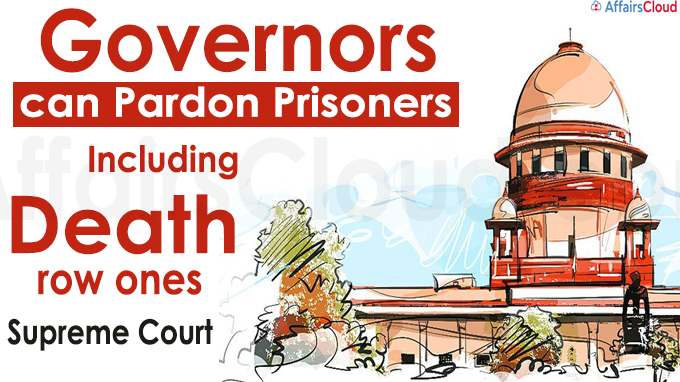 A Supreme Court bench comprising Justices Hemant Gupta & AS Bopanna held that the Governor of a state can pardon prisoners, including death row convicts, even before they have served a minimum 14 years of prison sentence, as per constitutional powers granted to Governors under Article 161 of the Indian Constitution.
A Supreme Court bench comprising Justices Hemant Gupta & AS Bopanna held that the Governor of a state can pardon prisoners, including death row convicts, even before they have served a minimum 14 years of prison sentence, as per constitutional powers granted to Governors under Article 161 of the Indian Constitution.
i.The court also noted that the sovereign power of a Governor to pardon a prisoner under Article 161 is actually exercised by the State government and not the Governor on his own. So, the advice of the appropriate government will be binding on the Governor.
ii.The Section 433-A of the Code of Criminal Procedure (CrPC), will not affect the constitutional power conferred on the President/Governor to grant pardon to convicts (under Articles 72 or 161 of the Indian Constitution).
iii.As of now, only the President had the power to grant pardon in all cases including death sentence cases.
What does Section 433-A of the CrPC say?
i.Section 433A of the CrPC states that a prisoner’s sentence can be remitted only after 14 years of jail.
Remission Power of State Government
Under Section 432 of CrPC, State Governments can grant remission of sentence to a prisoner only if he has undergone 14 years of actual imprisonment.
Pardoning Power of Governor & President
Article 72 – Power of the President to grant pardons, etc., and to suspend, remit or commute sentences in certain cases.
Article 161 – Power of Governor to grant pardons, etc., and to suspend, remit or commute sentences in certain cases.
Types of Pardons
Pardon – Completely absolving the person of the crime and letting him go free.
Commutation – Changing the type of punishment given to the guilty into a less harsh one. For eg. Death penalty commuted to a life sentence.
Reprieve – a delay allowed in the execution of a sentence, usually a death sentence, for a guilty person to allow him some time to apply for Presidential Pardon or some other legal remedy to prove his innocence or successful rehabilitation.
Respite – Reducing the quantum or degree of the punishment to a criminal in view of some special circumstances, like pregnancy, mental condition etc.
Remission – Changing the quantum of the punishment without changing its nature, for example reducing twenty-year rigorous imprisonment to ten years.
About Supreme Court
Chief Justice – Justice N.V. Ramana
Articles 124 to 147 in Part V of the Constitution of India deals with the Supreme Court.




